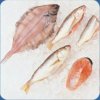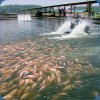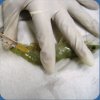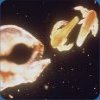 |
 |
 |
 |
 |
Laboratory of Microbiology
Department of Physiology, Biochemistry and Microbiology< Faculty of Sciences
Personnel
- Paul De Vos
- Peter Vandamme
- Anne Wilems
- Danielle Janssens
- Geert Huys
- Dirk Gevers
- Rieka Reekmans
- Stefanie Van Trappen
- 10 to 15 PhD students (resident or affiliated)
Activities
Since the introduction of molecular techniques in bacterial taxonomy in the 1960s, the Laboratory of Microbiology of the Faculty of Sciences of UGent (LM-UGent) has steadily found its place among the expert labs in classification, identification, typing and detection of various bacterial groups. Through its wide expertise in bacterial systematics and microbial ecotaxonomy, research at LM-UGent involves a range of different bacterial groups:
- lactic acid bacteria involved in fermentation and spoilage of various foods or used as probiotics
- Bacillus and Pseudomonas as contaminants or pathogens in food (incl. crop) production
- human pathogens and opportunists (incl. Campylobacter, Burkholderia and Helicobacter)
- pathogens and indicators of antibiotic resistance in aquaculture
- human and animal intestinal flora with emphasis on Bifidobacterium and Lactobacillus
- nitrogen-fixing bacteria (incl. Rhizobium and related groups)
Research in the field of aquaculture was introduced in LM-UGent by Prof. em. Jean Swings in the early 1990s and initially concentrated on isolation and identification of pathogenic vibrios using conventional biochemical approaches. With the introduction of DNA fingerprinting techniques such as Amplified Fragment Length Polymorphism (AFLP) and 16S rRNA gene sequencing, this line of research gradually extended to other relevant groups such as Aeromonas and Photobacterium. Combined with DNA-DNA hybridizations as golden standard for species delineation, this research has resulted in the description of numerous new species mainly belonging to the genus Vibrio. Later, aquaculture research at LM-UGent also focussed on other aspects including molecular ecology of antibiotic resistance in aquaculture environments and the bacterial characterization of commercial nitrifying inocula and probiotic formulas used in aquaculture production.
LM-UGent has been actively involved as research partner in projects of several EU framework programmes including “Risk assessment of antimicrobial use in aquaculture” (1997-1999) and “ Hazard analysis of antimicrobial resistance associated with Asian aquaculture environments” (2002-2005). These projects helped to establish fruitful collaborations with European and Southeast-Asian aquaculture expert groups at University of Galway (Ireland), University of Stirling and Heriot-Watt University (Scotland), Can Tho University (Vietnam), Aquatic Animal Health Research Institute (AAHRI, Thailand) and Universiti Putra Malaysia (Malaysia). With the support of the Conselho Nacional de Desenvolvimento Cientifico e Tecnologico (CNPq, Brazil), a four-year scholarship was awarded to Dr. Fabiano Thompson and resulted in an internationally acknowledged PhD on the improved taxonomy of the family Vibrionaceae.
In 2005, LM-UGent organized the international two-day conference “Vibrio 2005” on the biology of vibrios in Ghent, bringing together over 120 researchers involved in studying the biodiversity, ecology, genomics, disease and epidemiology of this important aquaculture organism. Members of LM-UGent are actively involved in several expert committees including the Subcommittee on the Taxonomy of Vibrionaceae and Aeromonas Taxonomy Working Group Committee of the International Committee on Systematics of Prokaryotes and the Working Group on Aquaculture of the Clinical and Laboratory Standards Institute (CLSI), Wayne, PA, USA.
The BCCM/LMG Bacteria Collection is a service-directed unit within LM-UGent which currently holds up to 22.000 well-characterized type and reference strains including valuable subcollections of Vibrio, Aeromonas and Photobacterium (alltogether app. 1000 strains). This public collection thus forms a rich source of bacterial reference material for researchers and industries worldwide. An identification system based on AFLP fingerprints has been developed at BCCM/LMG specifically for Vibrionaceae and is available on a service basis.
Current research topics of LM-UGent of relevance to the field of aquaculture include:
- Study of microbial diversity through state-of-the art taxonomic tools including sequence analysis of ribosomal RNA and house keeping genes, a range of species- or strain-specific DNA fingerprinting methods (including AFLP), whole genome DNA-DNA hybridisations and chemotaxonomic methods
- High throughput bacterial identification through cellular fatty acid analyses, Raman spectroscopy and MALDI-TOF mass spectrometry
- Analysis of microbial populations through DGGE and real-time PCR
- Study of microbial evolution through multilocus sequence analysis of house keeping genes (special interest groups include Vibrio, Aeromonas, the Bacillus subtilis group and lactic acid bacteria)
- Computerized data handling and database construction, development of bioinformatics tools for storage, exploitation and analysis of biological data
- ISO 9001:2000 certified Biological Resource Center (BCCM/LMG) facilities for the preservation and distribution of bacterial cultures
Contact
- e-mail addresses
- tel: + 32 9 264 5131
- fax: + 32 9 264 5092
- Mailing address:
- Laboratory of Microbiology, Faculty of Sciences, UGent, K.L. Ledeganckstraat 35, B-9000 Gent, Belgium

Laboratory of Aquaculture (Rozier 44 (tel: +32 (0)9 264.37.54 (fax: +32 (0)9 264.41.93

